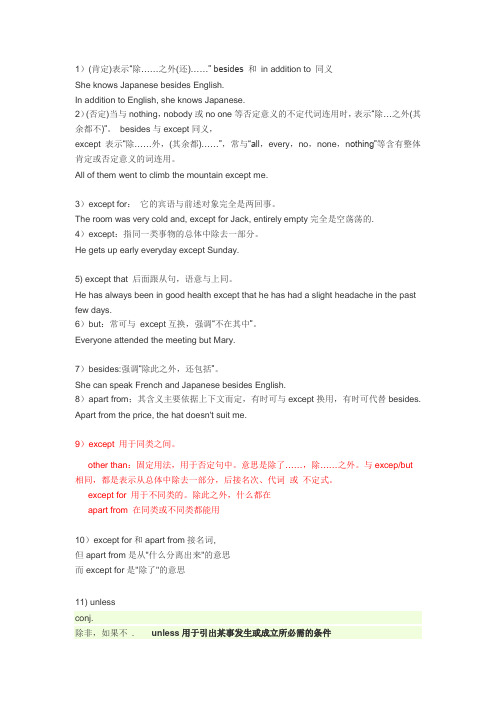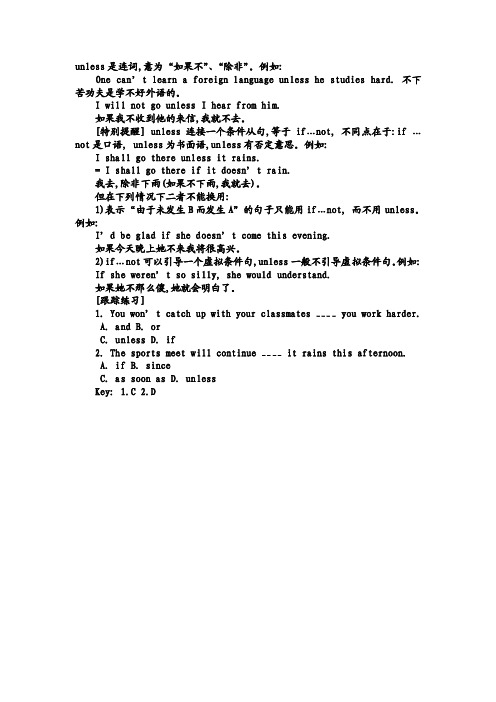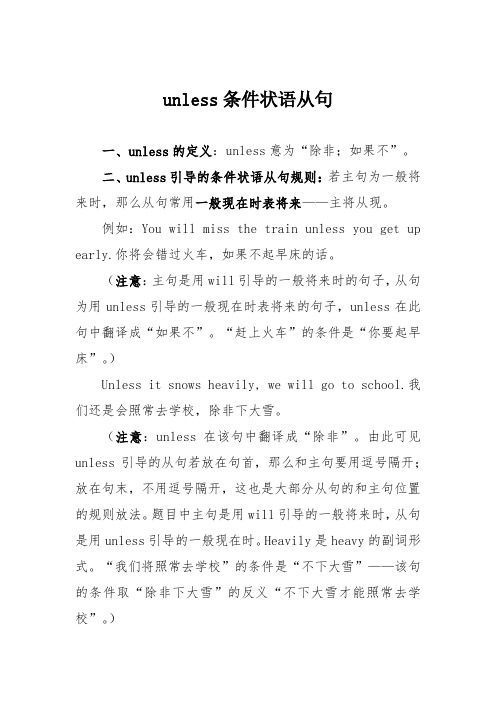Unless的用法总结
unless 与 if not

Unless 与 if not1. unless 与if … not 都可以用来引导条件状语从句, unless 的语气较重,从句中的动词用一般现在时代替一般将来时。
例如:We will visit the Great Wall tomorrow unless it rains.除非明天下雨,否则我们就去参观长城。
I won't believe what you said unless I've seen it with my own eyes.我要亲眼所见才能相信你所说的。
Don't enter the lab unless you are permitted to.只有经过允许才能进入实验室。
2. 有的同学在遇到使用 unless 的句子时,弄不清该用肯定还是否定而出错。
这时最好的办法是将 unless 替换成if … not 的结构,从而就一目了然了。
例如:I won't go to the party unless I am invited. ( =I won't go to the party if I am not invited. )如果没有人邀请我,我是不会去参加聚会的。
3. 由于 unless 与if … not 的语气不同,有时两者替换后,其意思就不一样了。
例如:Unless he were my friend, I shouldn't expect his help.除非他是我的朋友,我才会期待他的帮助。
(本句的潜在意思为:他并不是我的朋友。
)If he were not my friend, I shouldn't expect his help.如果他不是我的朋友,我就不会期待他的帮助了。
(本句的潜在意思为:正因为他是我的朋友,我才会期待他的帮助。
)4. 在平时使用过程中,要注意 unless 与 until 的区别。
except besides unless (除了)区别和用法

1)(肯定)表示“除……之外(还)……” besides 和in addition to 同义She knows Japanese besides English.In addition to English, she knows Japanese.2)(否定)当与nothing,nobody或no one等否定意义的不定代词连用时,表示“除…之外(其余都不)”。
besides与except同义,except 表示“除……外,(其余都)……”,常与“all,every,no,none,n othing”等含有整体肯定或否定意义的词连用。
All of them went to climb the mountain except me.3)except for:它的宾语与前述对象完全是两回事。
The room was very cold and, except for Jack, entirely empty完全是空荡荡的.4)except:指同一类事物的总体中除去一部分。
He gets up early everyday except Sunday.5) except that 后面跟从句,语意与上同。
He has always been in good health except that he has had a slight headache in the past few days.6)but:常可与except互换,强调“不在其中”。
Everyone attended the meeting but Mary.7)besides:强调“除此之外,还包括”。
She can speak French and Japanese besides English.8)apart from;其含义主要依据上下文而定,有时可与except换用,有时可代替besides. Apart from the price, the hat doesn't suit me.9)except 用于同类之间。
unless if until although because but辨析

unless if until although becausebut辨析“unless”、“if”、“until”、“although”、“because”和“but”均为英语中的连词,用于连接句子或句子的各个部分,使语言表达更清晰、流畅。
它们之间的区别如下:- “unless”:引导条件状语从句,表示“除非”的意思。
例如:“You will fail the exam unless you study hard.”(除非你努力学习,否则你会考试不及格。
)- “if”:引导条件状语从句,表示“如果”的意思。
例如:“If it rains tomorrow, we will stay at home.”(如果明天下雨,我们将呆在家里。
)- “until”:引导时间状语从句,表示“直到”的意思。
例如:“I didn't go to bed until my mother came back.”(直到我妈妈回来,我才去睡觉。
)- “although”:引导让步状语从句,表示“尽管”的意思。
例如:“Although she studied hard, she still failed the exam.”(尽管她努力学习,但仍然考试不及格。
)- “because”:引导原因状语从句,表示“因为”的意思。
例如:“I didn't go to the party because I was tired.”(因为我累了,所以我没有去参加聚会。
)- “but”:引导转折关系,表示“但是”的意思。
例如:“She is young, but she is very smart.”(她虽然年轻,但非常聪明。
)。
unless后面的动词用什么形式

unless后面的动词用什么形式
在英语中,unless 是一个连词,用于引导条件状语从句。
在unless 引导的条件状语从句中,动词的形式通常是使用一般现在时来表示将来时的情况。
这是因为在条件状语从句中,我们通常使用一般现在时来描述一个假设的情况或条件,而主句则使用将来时来表示这个条件或假设实现后的结果。
例如,在句子"I will not go to the party unless you invite me." 中,unless 引导的条件状语从句是"you invite me",其中的动词"invite" 使用了一般现在时,表示假设的情况。
而主句"I will not go to the party" 则使用了将来时,表示如果这个假设条件实现的话,将会产生的结果。
需要注意的是,如果条件状语从句中的动词是表示客观事实或普遍真理的动词,如"be"、"know"、"understand" 等,那么即使条件状语从句描述的是将来时的情况,动词仍然需要使用一般现在时。
总之,在unless 引导的条件状语从句中,动词的形式通常是使用一般现在时来表示将来时的情况。
但具体还需要根据语境和语法规则进行判断。
unless是连词,意为如果不”、除非”。例如:

unless是连词,意为“如果不”、“除非”。
例如:One can’t learn a foreign language unless he studies hard. 不下苦功夫是学不好外语的。
I will not go unless I hear from him.如果我不收到他的来信,我就不去。
[特别提醒] unless连接一个条件从句,等于if…not, 不同点在于:if …not是口语, unless为书面语,unless有否定意思。
例如:I shall go there unless it rains.= I shall go there if it doesn’t rain.我去,除非下雨(如果不下雨,我就去)。
但在下列情况下二者不能换用:1)表示“由于未发生B而发生A”的句子只能用if…not, 而不用unless。
例如:I’d be glad if she doesn’t come this evening.如果今天晚上她不来我将很高兴。
2)if…not可以引导一个虚拟条件句,unless一般不引导虚拟条件句。
例如:If she weren’t so silly, she would understand.如果她不那么傻,她就会明白了。
[跟踪练习]1. You won’t catch up with your classmates ____ you work harder.A. andB. orC. unlessD. if2. The sports meet will continue ____ it rains this afternoon.A. ifB. sinceC. as soon asD. unlessKey: 1.C 2.D。
unless用法大观园

⑨
U 巳 nI55 田 = I 吉二 畹目 二
安徽 姜 经 志
连词 u ls 意为 “ 非 …… 如果不 … …” “ 了…… ” nes 除 ,除 ,多引 导一 个否 定 意义 的真 实条 件 句. 有时也 可 引导非 真实 条件 句 。l l s引导条 件句 时 , 要用 于下 列情 况 。 le ns 主 (1 1主句 为肯 定句 。例 如 :
T e o l nt f r o l e i u h a t x e sv p r n ne 8 t e e e r h h y c u d ’ a f d t i n s c r e p n ie a a t o v me t l [, y w r i . l s h c
除非 他们很 富有 . 则就住 不 起这 么 昂贵 的公 寓 。 否
与原句 意义完全 相反 了。
语
HI S 从 句表 示 与事实 相反 的情 况 。如果 把 u ls 换成 i o ( f h yw r n t i ) Ies I nes f t …ite ee o c 就 …n rh
() 句 a i g t i U l S e e S r ft ef c s o l nt e s y n h s n e S 1w r l e o a t. l h
要是 我对这 些事 情没 有把 握 , 我就 不说 这话 了 。
Une s Ivste ey b o tr n twn h l no n w ehe alg twh t1wa . ls ii v r o kso e i o .Is a l tk o wh t r Ic l e a nt
如果 我不 到城里 每一 家 书店 去看看 , 就不 知道 是否 能买 到我想 要 的书 。 我 Y u 1 a ahaanu ls y uw r ad r 如果你不再加把劲 , o , ii m t gi nes o okhre. 1f ln 你数学考试还会不及格。
unless的用法

小议“unless”的用法(2009-09-17 17:54:11)转载标签:unless的用法教育分类:英语学习在英语教学中,我们发现学生在使用貌似简单的unless时经常出错,众多词典和语法书讲解又不够详细,因此本文拟就以下方面作必要说明。
一、unless的基本用法连词unless意为“除非……如果不……”,“除了……”,多引导一个否定意义的真实条件句,有时也可引导非真实条件旬。
unless引导条件句时,主要用于下列情况。
(1)主句为肯定句。
如:Unless I visit every bookstore in town.I shall not know whether I can get what l want.如果我不到城里每一家书店去看看,我就不知道是否能买到我想要的书。
You will miss the bus unless you hurry up.你要不快点就会错过班车。
You’ll fail in chemistry again unless you work harder.如果你不再加把劲,你化学考试还会不及格。
(2)主句为否定句。
如:Unless you oil the motor regularly.it won’t run smoothly.要不是你经常给发动机上油。
它就不会转得那么顺畅。
I wouldn't be saying this unless I were sure of the facts.要是我对这些事情没有把握,我就不说这话了。
You will never get anywhere unless you have set your goal.如果你不设定目标,你哪儿也去不了。
二、应注意的一些问题1.unless不能与if'"not换用的情况unless在意义上相当于if...not,因此在有些场合中unless与if...not可互换使用。
unless条件状语从句

unless条件状语从句一、unless的定义:unless意为“除非;如果不”。
二、unless引导的条件状语从句规则:若主句为一般将来时,那么从句常用一般现在时表将来——主将从现。
例如:You will miss the train unless you get up early.你将会错过火车,如果不起早床的话。
(注意:主句是用will引导的一般将来时的句子,从句为用unless引导的一般现在时表将来的句子,unless在此句中翻译成“如果不”。
“赶上火车”的条件是“你要起早床”。
)Unless it snows heavily, we will go to school.我们还是会照常去学校,除非下大雪。
(注意:unless在该句中翻译成“除非”。
由此可见unless引导的从句若放在句首,那么和主句要用逗号隔开;放在句末,不用逗号隔开,这也是大部分从句的和主句位置的规则放法。
题目中主句是用will引导的一般将来时,从句是用unless引导的一般现在时。
Heavily是heavy的副词形式。
“我们将照常去学校”的条件是“不下大雪”——该句的条件取“除非下大雪”的反义“不下大雪才能照常去学校”。
)三、补充:unless引导的条件状语从句可与if……not 引导的条件状语从句进行互换。
例如:I'll go to school unless it snows heavily=I'll go to school if it doesn't snow heavily.如果不下大雪,我就去学校。
(注意:两个句子可以翻译成同一句话,译无定译,不过同学们在翻译的时候要注意汉英之间的文化差异,翻译的结果肯定是要减轻读者的视觉和感觉负担,同时也要兼顾作者的文章意向,就是作者要向读者传递什么信息,这才是最重要的。
)。
- 1、下载文档前请自行甄别文档内容的完整性,平台不提供额外的编辑、内容补充、找答案等附加服务。
- 2、"仅部分预览"的文档,不可在线预览部分如存在完整性等问题,可反馈申请退款(可完整预览的文档不适用该条件!)。
- 3、如文档侵犯您的权益,请联系客服反馈,我们会尽快为您处理(人工客服工作时间:9:00-18:30)。
Unless的用法总结 Unless 的用法 你们知道unless的用法吗?我们一起来学习学习吧,下面就和大家分享,来欣赏一下吧。
语法学习:Unless 的用法 Unless 的用法 一、unless的基本用法 连词unless:意为“除非……如果不……”,“除了……”,多引导一个否定意义的真实条件句,有时也可引导非真实条件旬。
unless引导条件句时 (1) 主句为肯定句。 如: Unless I visit every bookstore in town.I shall not know whether I can get what l want. 如果我不到城里每一家书店去看看,我就不知道是否能买到我想要的书。
You will miss the bus unless you hurry up. 你要不快点就会错过班车。 You’ll fail in chemistry again unless you work harder. 如果你不再加把劲,你化学考试还会不及格。 (2) 主句为否定句。 如: Unless you oil the motor regularly.it won’t run smoothly. 要不是你经常给发动机上油。它就不会转得那么顺畅。 I wouldnt be saying this unless I were sure of the facts. 要是我对这些事情没有把握,我就不说这话了。 You will never get anywhere unless you have set your goal. 如果你不设定目标,你哪儿也去不了。 小词不简单 unless口语用法指南 STRUCTURE 结构 As mentioned above, unless is a conjunction which we use in conditional phrases. In written English, the clause that follows unless is the subordinate clause (SC) meaning that it needs a main clause (MC) to make a complete sentence. It is similar to how we use if in conditional phrases.
之前提过,unless是在条件句中使用的连词。在书面语种,使用unless的从句叫做从属句(SC),需要主句(MC)让句子完整。这就像if在条件句里的用法一样。
When unless comes before a main clause we use a comma: unless放在主句之前加逗号: Unless it rains, we’ll go for a picnic tomorrow. [en](SC) (MC) [/en] 除非下雨,否则我们明天去野餐。 When the main clause comes first, no comma is required: 主句在前,不需要逗号: They won’t come unless you invite them. [en](MC) (SC) [/en] 除非你邀请他们,否则他们不会来。 Unless is like If in that we don’t not use will/would after it. We only use the present simple tense.
像if一样,我们不会在unless后面使用will/would。只使用一般现在时。
Unless I hear from you, I’ll see you at 5pm. 除非你通知我,否则我和你下午5点碰面。 HOW DO WE USE “UNLESS”? 如何使用“unless”? Unless and if not unless和if not Ok, so unless is similar to “if …..not” and together they mean “except if”. Note: We refer to real conditional situations and NOT impossible situations.
unless和if…not很相似,它们都表示“除非”。注意:我们指的是真实的条件情况,而不是不可能的情况。 If you don’t study, you will fail your exam./ Unless you study, you will fail.
如果你不学习,你考试就过不了。/除非你学习,否则你就过不了考试。
We could eat at Frankie and Benny’s if they’re not closed on a Monday/ We could eat at Frankie and Benny’s unless they are closed on a Monday.
如果弗兰基班尼餐馆周一不关门,我们可以在那吃饭。/除非弗兰基班尼餐馆周一关门,否则我们就在那吃饭。
I’ll make dinner if nobody wants to/ I’ll make dinner unless someone else wants to.
如果没人想做饭的话,我做吧。/除非没别人想做饭,那么我就来做吧。
If you don’t stop smoking, you will feel bad/ Unless you stop smoking, you will feel bad
如果你不戒烟,你会不舒服的。/除非你戒烟,不然你会感觉不舒服。
Note that the sentence after unless is always a positive sentence. You cannot have a negative sentence after unless because that would make the sentence a double negative and senseless.
注意:unless之后的句子总是肯定的。在unless之后不能接否定句,因为这就造成了双重否定,句子没有意义。
Example: Unless you don’t study, you will fail. () 例句:除非你不学习,否则你就会失败。(注:即使是此句的中文译文也是一个有语义问题的病句,双重否定后使句子无逻辑意义了,符合逻辑的句子应该是“除非你学习,否则你就会失败。”)
..arning: Typical Error 警告:典型错误 We don’t use “unless” when we mean if. 表示“如果”的时候不用unless。 Example: If you feel ill, I can drive/ Unless you feel ill, I can drive
例句:如果你觉得不舒服,我来开车吧。/除非你觉得不舒服,否则我来开车吧。
Spoken English 口语 When speaking, we use unless to introduce an extra thought or piece of information:
说话的时候,我们用unless表达一些额外的思考或者是信息:
He didn’t even know about the crash – unless he’d heard about it on the radio.
他都不知道那场空难—除非他在广播上听说了。 A: Oh look. Neil next door’s got a new car. A:看!尼尔的邻居有了辆新车! B: Unless they’ve got a visitor. B:除非他们来客人了。 HOW ABOUT “NOT UNLESS”? not unless的用法呢? Not unless is similar to only if not unless和only if相似 Example: 例句: Shall I tell Liz what happened? Not unless she asks you (= only if she asks you)
我需要告诉利兹发生的事吗?除非她问起来。 Will you come shopping with me? Not unless you offer me lunch (= only if you offer me lunch)
你和我一起去逛街吗?除非你给我提供午餐。 unless 与 if ... not 的用法区别(知其然,知其所以然) 两者都可表示否定的条件,有时可换用。如: Come tomorrow unless I phone [if I don’t phone]. 要是我没有打电话,明天就来。
You won’t catch the train unless you hurry [if you don’t hurry]. 你要是不赶快,你就赶不上火车了。
但是在下列情况下,通常要用 if ... not 而不用 unless: 1. 当所述条件要引出一种新的想法或情况时。如: I’ll be angry if I’m not invited to the party. 如果不邀请我参加晚会,我会生气的。
